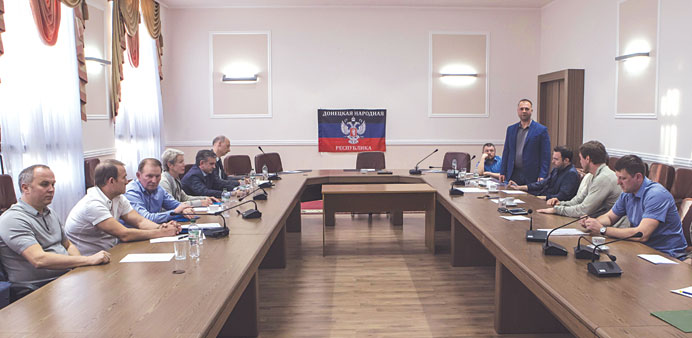Alexander Borodai, the ‘prime minister’ of the self-proclaimed ‘Donetsk People’s Republic’, speaks during a meeting between former Ukrainian president Kuchma (third from left), OSCE ambassador Heidi Tagliavini (fourth left) and Russian Ambassador to Ukraine Mikhail Zurabov (fifth left), and the leaders of two self-proclaimed ‘Donetsk People’s Republic’ and ‘Luhansk People’s Republic’, in Donetsk.
Reuters
Separatist leaders in two main areas of Ukraine’s east have agreed to observe a ceasefire in their conflict with Ukrainian forces until June 27, one of them, Alexander Boroday, said yesterday.
Speaking after meeting a “contact group”, which included a former Ukrainian president, Moscow’s envoy to Kiev and a representative of the OSCE security watchdog, Boroday said: “The consultation ended with authorities of the Luhansk and Donetsk Republics agreeing to maintain a ceasefire for their part, until the 27th.”
The truce will run parallel to a unilateral Ukrainian military ceasefire declared by President Petro Poroshenko on Friday as part of a peace plan to end an insurgency by pro-Russian separatists in the Russian-speaking east of Ukraine.
“We have agreed a two-way ceasefire until 10am on the morning of June 27 ... one of the key problems has been resolved,” former president Leonid Kuchma, who took part in the talks, said.
Though Poroshenko announced his ceasefire last Friday, Kiev reported a spate of attacks on Ukrainian military and border posts over the weekend.
The announcement yesterday by Boroday, “prime minister” for the so-called “Donetsk People’s Republic”, came at the end of the first day of non-violence in the rebellious east in weeks.
“For the period from 9am to 5pm no incidents of use of weapons were recorded,” Volodymyr Chepovy, an official of Ukraine’s National Security and Defence Council, said. “There were no attempts to seize administrative buildings or military points etc.”
Scores of people have been killed and wounded in Ukraine since the rebellions erupted in Ukraine’s industrial east in April following the toppling of the Moscow-backed Viktor Yanukovych in February and Russia’s subsequent seizure of Crimea.
They include about 150 Ukrainian servicemen – including 49 who died when a plane was brought down by rebel fire – and scores of rebels and ordinary citizens in the worst fighting since Ukraine secured independence in 1992.
Poroshenko has refused direct dialogue with the rebel leaders themselves despite Moscow’s urging, and yesterday’s consultations appeared an attempt to meet Russian demands half-way.

